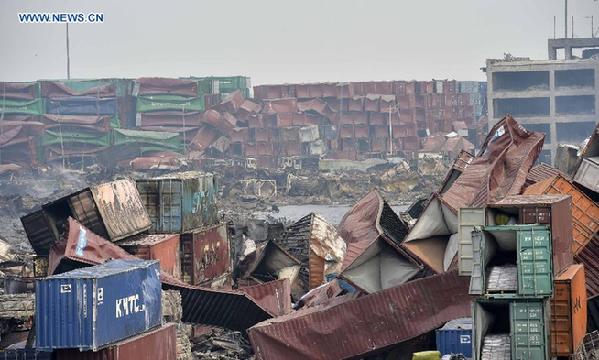Mystery surrounds Tianjin blasts warehouse
- By Chen Xia
 0 Comment(s)
0 Comment(s) Print
Print E-mail China.org.cn, August 18, 2015
E-mail China.org.cn, August 18, 2015
|
|
|
Photo taken on Aug. 17, 2015 shows the warehouse explosion site in Tianjin. Death toll of the massive Tianjin blasts rose to 114 after rescuers found two more bodies in the debris, a municipal publicity official said on Monday. [Xinhua] |
How did Ruihai handle dangerous chemicals?
The available evidence shows that Ruihai broke many regulations on handling dangerous chemicals.
For example, the warehouse is allowed to store a maximum of 24 tons of sodium cyanide, but Niu Yueguang, deputy director of the Fire Department of the Ministry of Public Security, revealed yesterday that there were around 3,000 tons of dangerous chemicals at the explosion site, including 700 tons of sodium cyanide, 800 tons of ammonium nitrate and 500 tons of potassium nitrate.
Ruihai also violated the regulations on how dangerous chemicals should be stored. Li Hua, who was familiar with the warehouse, said that Ruihai used to store dangerous goods in a transit storage site which was designated to store inorganic sodium hydroxide.
Lorry driver Li Zhiqiang used to deliver cargo to Ruihai's warehouse. He recalled that the company's storage site was always full of dangerous chemicals. Containers were placed in the open air, and there were no separate storage sites for different levels of dangerous chemicals. He also recalled that the distance between container stackers was shorter than required, and the amount of chemicals packed into containers was much higher than the upper limit.
The location of the warehouse was also a problem. Under current laws, large and medium-sized warehouses for dangerous chemicals should be at least 1,000 meters away from public buildings, but there were several residential communities near Ruihai's warehouse. Two of them were no more than 600 meters away from the explosion site and were built long before Ruihai built its warehouse.
Which government department should supervise Ruihai?
According to a local government document released in 2014, the local Work Safety Bureau should supervise Ruihai's operation. However, an official from the bureau said that Ruihai was not in the bureau's charge, because it submits its business applications to Tianjin Port Group.
Normally, Dongjiang Free Trade Port Zone, where Ruihai's warehouse is located, should also oversee Ruihai's work safety conditions. But after the accident, the zone's administration committee told the media that although Ruihai registered its office there, the committee didn't have the power to supervise it.
"These government departments' denial responsibility is against the Regulation on the Safety Management of Hazardous Chemicals," said a public administration professor in Tianjin.
Was the "judge" also a "player" in the game?
Many government officials said that Ruihai is in charge of Tianjin Port Group, but does the group have power over it?
Tianjin Port Group is a large state-owned enterprise. It evolved from the former Tianjin Port Administration. On Nov. 15, 2003, the administration was separated, and its administration functions were transferred to the Tianjin Municipal Transportation Commission and its business functions were transferred to Tianjin Port Group. The group is responsible for business promotion in Tianjin port.
"If Tianjin Port Group has the power to examine Ruihai's business plans and approve its application for handling dangerous goods, it is like a referee who is also playing in the match ," said an expert on public administration in Beijing.
So far, no one in the group has responded to media requests to comment on the issue.







Go to Forum >>0 Comment(s)